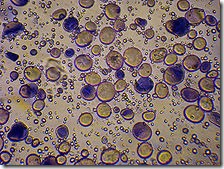
Wheat starch under a microscope
Food starch can break your gluten free diet, if the starch is made from wheat or other gluten-containing grains.
Current labeling laws in Canada make it difficult to be sure how pure starch is when listed in food ingredients.
Starch can be made from any number of raw ingredients. The most common in Canada is corn starch, but wheat starch is also common.
Current labeling laws in Canada are weak. Currently, labeling is supposed to be as follows:
If the ingredient contains any protein from the allergen source, the food allergen source must be declared e.g. soy lecithin, wheat starch, egg lecithin etc.
The manufacturer could decide that there is not significant amount of protein in the starch, and elect not to list what was used to make the starch. We can’t be sure that the starch was once protein-free, but that they changed their supplier, or that starch made from wheat is guaranteed 100% safe for those with celiac disease or a gluten allergy.
Starch Listed in the Ingredients – What To Do in Canada
If starch is listed in the ingredients for a food product for sale in Canada, what should a celiac or gluten allergy sufferer do? Should you risk your gluten-free diet?
You could avoid the food completely. If there is an alternate choice that is clearly labeled, I suggest you choose that instead, but for your own peace of mind, and to reward manufacturers who are more forthcoming in their labeling.
You should also phone the manufacturer and ask them what the starch is derived from.
Yes, you could visit their website, but I suggest you call them instead. Here’s why. Firstly, visiting their website could be a big waste of your time. The gluten status of the food may be hard to find, or not there at all.
Secondly, when you call the manufacturer, your request will probably be logged, and your feedback, along with that of other gluten avoiders, will probably make a difference to their future labeling decisions.
Canadian Labeling Laws May Change
According to the Canadian Food Inspection Agency:
It is expected that the future food allergen labeling amendments to the FDR will require the declaration of the sources of lecithin, hydrolyzed protein, starch and modified starch, regardless of the source or the presence or absence of protein residue.
This is good news, and part of a larger trend expected to take place with food labeling laws in Canada.
Meanwhile, if you are allergic to gluten, have celiac disease, or are gluten intolerant in any way, avoid food products that list starch in the ingredients, unless they specify that the starch is from corn (or some other non-gluten source).
{ 2 comments… read them below or add one }
Hi there, over the past year I have been struggling with major stomach issues. I found out I have a wheat allergy, lactose intolerant, sulfite, msg. I have been wheat free for 6 months now still having issues. For example for dinner tonight everything was save, ate bake potato with meal, right after I stomach issues, so I did some searching I also think starch is a issue, yams always was a problem but never thought potatos would be a problem. I can not eat corn, soy flour , My naturopath can’t believe how many allergies keep popping up WHY??? Any answers would help
“Why?” Yes, very good question. I don’t know the answer to that, and I don’t think anybody really does. If ever I have some clues, I’ll publish them on this website.
Sometimes it takes a while to find the root of the problem. Mean while, you may be unusually sensitive to some foods, and those problems may clear up later (but don’t depend on it).
If you find that a food is an issue, do avoid it. Try to clear out everything from your diet that might be a problem. I hope that over time you will be able to feel better, although at the expense of a more restrictive diet.
You may find that certain foods are the biggies, and that the others are OK if eaten occasionally and in moderation.